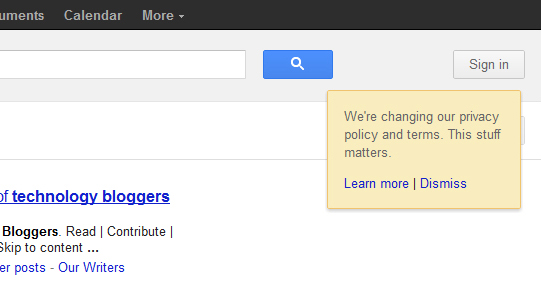With all of the buzz surrounding Google’s new privacy policy, you may be confused about the exact changes and how they will affect your internet usage. The bottom line is, the changes aim to improve the services that Google offers by making your Google experience more personalized.
 Here are five things that everyone should know about the changes that will come occur when Google’s new policy takes effect on the 1st of March.
Here are five things that everyone should know about the changes that will come occur when Google’s new policy takes effect on the 1st of March.
5. Google will gather information across all of its platforms
Google’s new policy puts the majority of its platforms into one privacy policy. Through this policy, Google will be able to put together a more holistic view of each user, as it can track one user’s data across all of its platforms together.
For you as user, this means that all of Google’s platforms will be more closely integrated than before and will allow you to work across multiple platforms at once more easily. Some critics however say that Google trying to create a ‘cauldron of data’ of its users.
4. You’ll see more personalized search results and advertisements
Since Google will be able to get a more complete view of you as a user, it will be using this information to personalize your internet experience more than ever before.
For example, this means that Google will tailor advertisements and search results to suit your specific needs, correct frequent spelling errors in search queries, remind you of appointments about which you may have forgotten, provide you with a suggested contact list, and much more. You can also contribute to the personalization of your internet experience by using features like the Ads Preference Manager to take control of what kind of advertisements you see.
These changes should help to improve user experience, as well as Google’s profits, as users are more likely to click on ads more relevant to them.
3. The more Google services you use the more you should benefit from the changes
Because Google will rely on your user information across all of its platforms to determine what type of advertisements, search results, and more are best for you, the more Google services you use, the more improvements you will be likely to see.
This is because if you use a host of Google services, such as all of those included in Google Apps, Google will be able to get the most complete picture of who you are, what you look for online, and how you generally use the internet. To track your usage of Google services, you can use the Google Dashboard to see your activity as a Google user.
2. You can still use Google services without it logging your data
Although allowing Google to learn information about your online usage will provide a more personalized experience, there may be times when you don’t want Google to collect certain information about you.
In these instances, you can utilize Google tools like “off the record” chat in Gmail and the “incognito window” in the Google Chrome web browser to ensure that all of your data will not be logged by Google.
However it is thought that Google will try to persuade users to remain logged in and connected through their Google profile, more of the time.
1. Google believes the new policy will allow it to better meet your needs
Google redid its privacy policy because it believes the changes will enable it to offer each individual user a more tailored, better experience of the web. In summary, Google is hoping to meet your needs better and faster by learning who you are and what you look for online.
What do you think about the proposed changes? Do you think you will benefit?

